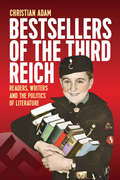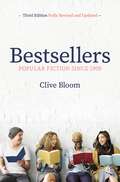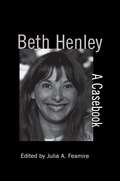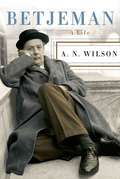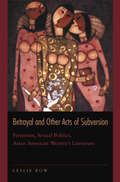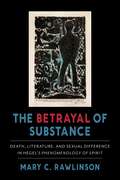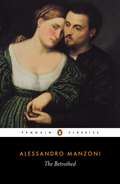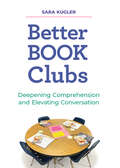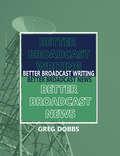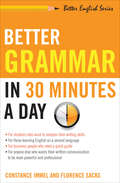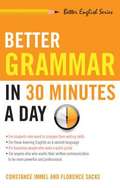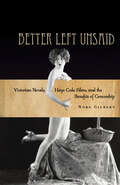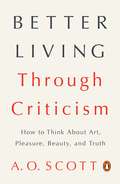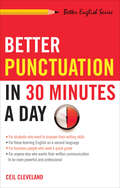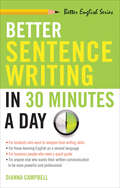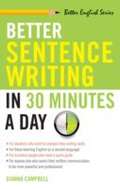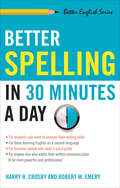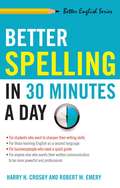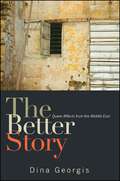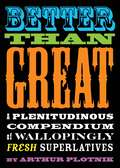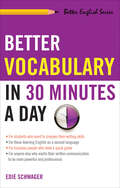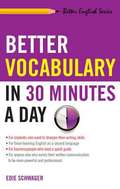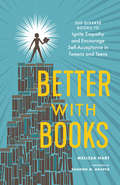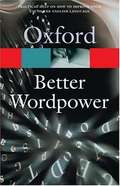- Table View
- List View
Bestsellers of the Third Reich: Readers, Writers and the Politics of Literature
by Christian AdamDespite the displacement of countless authors, frequent bans of specific titles, and high-profile book burnings, the German book industry boomed during the Nazi period. Notwithstanding the millions of copies of Mein Kampf that were sold, the era’s most popular books were diverse and often surprising in retrospect, despite an oppressive ideological and cultural climate: Huxley’s Brave New World was widely read in the 1930s, while Saint-Exupéry’s Wind, Sand and Stars was a great success during the war years. Bestsellers of the Third Reich surveys this motley collection of books, along with the circumstances of their publication, to provide an innovative new window into the history of Nazi Germany.
Bestsellers: Popular Fiction Since 1900
by Clive BloomThis book charts the publishing industry and bestselling fiction from 1900, featuring a comprehensive list of all bestselling fiction titles in the UK. This third edition includes a new introduction which features additional information on current trends in reading including the rise of Black, Asian and LGBTQIA+ publishing; the continuing importance of certain genres and up to date trends in publishing, bookselling, library borrowing and literacy. There are sections on writing for children, on the importance of audiobooks and book clubs, self- published bestsellers as well as many new entries to the present day including bestselling authors such as David Walliams, Peter James, George R R Martin and far less well known authors whose books s sell in their thousands. This is the essential guide to best-selling books, authors, genres, publishing and bookselling since 1900, providing a unique insight into more than a century of entertainment, and opening a window into the reading habits and social life of the British from the death of Queen Victoria to the Coronavirus Pandemic.
Beth Henley: A Casebook (Casebooks on Modern Dramatists #33)
by Julia A. FesmireBeth Henley was awarded the Pulitzer Prize in Drama and the New York Drama Critics Circle Award for Best American Play for her first full-length play, Crimes of the Heart, yet there has been no book-length consideration of her body of work until now. This volume includes original essays that contextualize and analyze her works from a variety of perspectives, focusing on her vexed status as a southern writer, her use of the comic grotesque, and her alleged feminist critiques of modern society. Receiving special attention are lesser-known plays which are crucial to understanding Henley's development as a playwright and postmodern thinker.
Betjeman
by A. N. WilsonJohn Betjeman was by far the most popular poet of the twentieth century; his collected poems sold more than two million copies. As poet laureate of England, he became a national icon, but behind the public man were doubts and demons. The poet best known for writing hymns of praise to athletic middle-class girls on the tennis courts led a tempestuous emotional life. For much of his fifty-year marriage to Penelope Chetwode, the daughter of a field marshal, Betjeman had a relationship with Elizabeth Cavendish, the daughter of the Duke of Devonshire and lady-in-waiting to Princess Margaret. Betjeman, a devout Anglican, was tormented by guilt about the storms this emotional triangle caused.Betjeman, published to coincide with the hundredth anniversary of the poet's birth, is the first to use fully the vast archive of personal material relating to his private life, including literally hundreds of letters written by his wife about their life together and apart. Here too are chronicled his many friendships, ranging from "Bosie" Douglas to the young satirists of Private Eye, from the Mitford sisters to the Crazy Gang. This is a celebration of a much-loved poet, a brave campaigner for architecture at risk, and a highly popular public performer. Betjeman was the classic example of the melancholy clown, whose sadness found its perfect mood music in the hymns of a poignant Anglicanism.
Betrayal and Other Acts of Subversion: Feminism, Sexual Politics, Asian American Women's Literature
by Leslie BowAsian American women have long dealt with charges of betrayal within and beyond their communities. Images of their "disloyalty" pervade American culture, from the daughter who is branded a traitor to family for adopting American ways, to the war bride who immigrates in defiance of her countrymen, to a figure such as Yoko Ono, accused of breaking up the Beatles with her "seduction" of John Lennon. Leslie Bow here explores how representations of females transgressing the social order play out in literature by Asian American women. Questions of ethnic belonging, sexuality, identification, and political allegiance are among the issues raised by such writers as Jeanne Wakatsuki Houston, Bharati Mukherjee, Jade Snow Wong, Amy Tan, Sky Lee, Le Ly Hayslip, Wendy Law-Yone, Fiona Cheong, and Nellie Wong. Beginning with the notion that feminist and Asian American identity are mutually exclusive, Bow analyzes how women serve as boundary markers between ethnic or national collectives in order to reveal the male-based nature of social cohesion. In exploring the relationship between femininity and citizenship, liberal feminism and American racial discourse, and women's domestic abuse and human rights, the author suggests that Asian American women not only mediate sexuality's construction as a determiner of loyalty but also manipulate that construction as a tool of political persuasion in their writing. The language of betrayal, she argues, offers a potent rhetorical means of signaling how belonging is policed by individuals and by the state. Bow's bold analysis exposes the stakes behind maintaining ethnic, feminist, and national alliances, particularly for women who claim multiple loyalties.
The Betrayal of Substance: Death, Literature, and Sexual Difference in Hegel’s “Phenomenology of Spirit”
by Mary C. RawlinsonHegel’s Phenomenology of Spirit exerts a unique influence on contemporary philosophy. Major figures from Jacques Derrida and Luce Irigaray to Jean-Paul Sartre and Judith Butler were shaped in large part through their engagement with Hegel’s challenging masterwork. It unfolds a grand narrative of the ways of thinking and acting that comprise human experience. Along the way, Hegel seeks to incorporate all the fundamental structures of human life—from political community to consciousness to selfhood—into a whole that encompasses the total movement of human knowledge and culture.Mary C. Rawlinson offers a critical reading of the Phenomenology of Spirit that exposes three crucial elisions: Hegel’s effacements of sexual difference, human mortality, and literary style. In attempting to arrive at an “absolute knowing” that would transcend all differences, Hegel discounts specificity in each of these areas in favor of a generic subject. Rawlinson turns Hegel’s critique of abstraction against him, showing how his own phenomenological analysis undermines his attempt to master difference. Rawlinson’s critique reveals Hegel’s attempt to erase the difference of his own style, highlighting his images, tropes, and rhetorical strategies. Demonstrating how the power of Hegel’s phenomenological method goes beyond even Hegel’s own project of a pure logic, The Betrayal of Substance is a magisterial rereading of the Phenomenology of Spirit that encompasses crucially overlooked sites of complexity and difference.
The Betrothed
by Alessandro ManzoniSet in Lombardy during the Spanish occupation of the late 1620s, The Betrothed tells the story of two young lovers, Renzo and Lucia, prevented from marrying by the petty tyrant Don Rodrigo, who desires Lucia for himself. Forced to flee, they are then cruelly separated, and must face many dangers including plague, famine and imprisonment, and confront a variety of strange characters - the mysterious Nun of Monza, the fiery Father Cristoforo and the sinister 'Unnamed' - in their struggle to be reunited. A vigorous portrayal of enduring passion, The Betrothed's exploration of love, power and faith presents a whirling panorama of seventeenth-century Italian life and is one of the greatest European historical novels.
Better Book Clubs: Deepening Comprehension and Elevating Conversation
by Sara KuglerIn her comprehensive guide,Better Book Clubs: Deepening Comprehension and Elevating Conversation, literacy coach and staff developer Sara Kugler shows you how to combine the power of book clubs with assessment-driven instruction to support your students as they talk and think about texts together. Using authenticbook club conversationsas an assessment of academic talk and text understanding, Kugler raises the bar on typical professional discussions about book clubs, moving beyond teacher-directed interactions and surface-level conversations to include: Structures, teaching methods, and routines that support authenticity and independence in book clubsSuggestions for starting, scaffolding, and sustaining effective, student-centered book clubsTips for listening in on clubs as a way to assess academic talk and text understandingMethods for moving from observation into instruction that improves conversation and comprehensionTouchstone anchor charts and sample lessons for launching and maintaining strong clubs at a variety of independence levelsWith a dual focus on stronger comprehension and improved conversations,Better Book Clubs will help you establish effective book clubs that will engage your readers, enhance your learning communities, and become an indispensable component of your literacy classroom.
Better Britons
by Nadine AttewellIn 1932, Aldous Huxley published Brave New World, his famous novel about a future in which humans are produced to spec in laboratories. Around the same time, Australian legislators announced an ambitious experiment to "breed the colour" out of Australia by procuring white husbands for women of white and indigenous descent. In this study, Nadine Attewell reflects on an assumption central to these and other policy initiatives and cultural texts from twentieth-century Britain, Australia, and New Zealand: that the fortunes of the nation depend on controlling the reproductive choices of citizen-subjects.Better Britons charts an innovative approach to the politics of reproduction by reading an array of works and discourses - from canonical modernist novels and speculative fictions to government memoranda and public debates - that reflect on the significance of reproductive behaviours for civic, national, and racial identities. Bringing insights from feminist and queer theory into dialogue with work in indigenous studies, Attewell sheds new light on changing conceptions of British and settler identity during the era of decolonization.
Better Broadcast Writing, Better Broadcast News
by Greg DobbsBetter Broadcast Writing, Better Broadcast News teaches students how to write with the conversational simplicity required for radio and TV. This text draws on the Emmy Award-winning author's decades of professional experience in broadcast journalism. In addition to writing, the text also discusses the other elements that make up a good story--producing, reporting, shooting, editing, and ethics. The author's real-world perspective conveys the excitement of a career in journalism.
Better Grammar in 30 Minutes a Day (Better English)
by Constance Immel Florence SacksDo verb tenses make you tense? Does &“affect&” vs. &“effect&” put you in a panic? Help is here! This easy-to-use guide to grammar explains just how the English language works—especially the many ways it can trip you up—so you can write and speak with confidence. You&’ll find: •Thorough coverage of key areas of grammar •Easy-to-understand explanations and plenty of exercises to test and refine your skills •An answer key at the back of the book to encourage you to work at your own pace and check your answers as you go •A glossary for a quick review of any grammatical term discussed in the book Better Grammar in 30 Minutes a Day allows you to customize your learning—so you can use it even if you have as little as five minutes a day to spare. Like its companion guides in the Better English series, this book is just what the teacher ordered—and will have you on your way to being grammatically correct!
Better Grammar In 30 Minutes A Day
by Constance Immel Florence SacksDo you panic when you must decide whether to use "affect' or "effect"? Do verb tenses make you, well... tense? This easy-to-use guide to grammar not only teaches you to use the right verb at the right time but helps you brush up on all your rusty grammar skills so you can write and speak clear, error-free English with confidence. And the exercises and examples are actually interesting. *Thorough coverage of key areas of grammar. *Easy-to-understand explanations and plenty of exercises to test and refine your skills. *An answer key at the back of the book to encourage you to work at your own pace and check your answers as yew go. *A glossary for a quick review of any grammatical term discussed in the book. Even if you can't spare 30 minutes a day to become grammatically correct, Better Grammar In 30 Minutes A Day allows you to custom-design your learning to take as little as five minutes a day.
Better Left Unsaid: Victorian Novels, Hays Code Films, and the Benefits of Censorship
by Nora GilbertBetter Left Unsaidis in the unseemly position of defending censorship from the central allegations that are traditionally leveled against it. Taking two genres generally presumed to have been stymied by the censor's knife--the Victorian novel and classical Hollywood film--this book reveals the varied ways in which censorship, for all its blustery self-righteousness, can actually be good for sex, politics, feminism, and art. As much as Victorianism is equated with such cultural impulses as repression and prudery, few scholars have explored the Victorian novel as a "censored" commodity--thanks, in large part, to the indirectness and intangibility of England's literary censorship process. This indirection stands in sharp contrast to the explicit, detailed formality of Hollywood's infamous Production Code of 1930. In comparing these two versions of censorship, Nora Gilbert explores the paradoxical effects of prohibitive practices. Rather than being ruined by censorship, Victorian novels and Hays Code films were stirred and stimulated by the very forces meant to restrain them.
Better Living Through Criticism
by A. O. ScottThe New York Times film critic shows why we need criticism now more than everFew could explain, let alone seek out, a career in criticism. Yet what A.O. Scott shows in Better Living Through Criticism is that we are, in fact, all critics: because critical thinking informs almost every aspect of artistic creation, of civil action, of interpersonal life. With penetrating insight and warm humor, Scott shows that while individual critics--himself included--can make mistakes and find flaws where they shouldn't, criticism as a discipline is one of the noblest, most creative, and urgent activities of modern existence.Using his own film criticism as a starting point--everything from his infamous dismissal of the international blockbuster The Avengers to his intense affection for Pixar's animinated Ratatouille--Scott expands outward, easily guiding readers through the complexities of Rilke and Shelley, the origins of Chuck Berry and the Rolling Stones, the power of Marina Abramovich and 'Ode on a Grecian Urn.' Drawing on the long tradition of criticism from Aristotle to Susan Sontag, Scott shows that real criticism was and always will be the breath of fresh air that allows true creativity to thrive. "The time for criticism is always now," Scott explains, "because the imperative to think clearly, to insist on the necessary balance of reason and passion, never goes away."From the Hardcover edition.
Better Punctuation in 30 Minutes a Day (Better English)
by Ceil ClevelandTo achieve your goals, words alone aren’t enough. You need punctuation too!Who cares about commas, semicolons, dashes, and hyphens? Well, you should. A misplaced punctuation mark can confuse physicians and surgeons, cause thousands of dollars in legal fees, misinform judges, puzzle bankers, misguide stockbrokers, and even ruin a recipe.Luckily, you don’t need a teacher with a mouthful of jargon to show you how to make yourself clearly understood, whether it’s in a text or a term paper. Better Punctuation in 30 Minutes a Day lets you teach yourself. This small step-by-step handbook is an indispensable guide if you need to:• Compose high school or college papers• Apply to college or for a job• Write a resume• Communicate your thoughts to anyone, from your landlord to your loved oneYou can work on your own, at your own speed, and within your own time frame—and the rules of punctuation, often confusing and hazy, will finally become clear.
Better Sentence Writing in 30 Minutes a Day (Better English)
by Diana CampbellDiscover how to improve your sentence-writing skills in just thirty minutes a day with this easy-to-use, informative guide.Do your sentences run longer than a page? Or do they hang in the air, waiting for a subject, an object or some punctuation to finish them off?This easy-to-use guide to sentence writing not only teaches you how to overcome run-ons and sentence fragments, but also all of the sentence construction obstacles encountered by anyone who needs to master (or re-master) the English language—all without making you do a single dreaded diagram! You’ll learn a sentence-combining approach to writing that goes beyond helping you avoid errors by teaching you how to create sound sentences with variety and style.You’ll also find:Clear discussions of rules and strategies for good writingEasy-to-understand explanations and plenty of exercises, from fill-in-the-blanks to transforming short sentences into longer and more graceful combinationsAn answer key at the back of the book to encourage you to work at your own pace and check your answers as you goEven if you can’t spare thirty minutes a day to learn how to write brilliant sentences, Better Sentence Writing in 30 Minutes a Day allows you to customize your learning to take as little as five minutes a day.Just like its companion guides in the Better English Series, this book is just what the teacher ordered!
Better Sentence-writing In 30 Minutes A Day
by Dianna CampbellContains information on all types of sentence structures. Shows how to write simple and complex sentences, the properties of a sentence, punctuations, and more.
Better Spelling in 30 Minutes a Day (Better English)
by Harry H. Crosby Robert W. EmeryBecome a stellar speller with these self-tests, exercises, examples, and tips for spotting errors quickly!Do you use the dictionary more than you think you should? Are the business memos you write filled with embarrassing spelling mistakes? Have you received low grades on papers because of poor spelling? Starting with diagnostic exercises to help you understand your trouble spots, this easy-to-use book not only teaches you how to avoid misspellings, but also sharpens your skills so you can recognize spelling errors right away. You can write clean, clear English, improve your grades, and increase your chances of finding a new or better job. Learn about:Phonics and spellingThree major rulesPrefixes, suffixes, and apostrophesProofreadingSpelling proper nouns and place namesThe most commonly confused wordsStaying up-to-date as the English language evolves, and more
Better Spelling In 30 Minutes A Day
by Robert W. Emery Harry H. CrosbyDo you use the dictionery more then you think you should? Are the business memos you write filled with embarassing spelling mistakes? Have you recieved alot of low grades on your papers because of poor spelling? Did you notice that some of the words in the above questions (dictionary, fhan, embarrassing, received, a lot) were misspelled? If not, you need this book. This easy-to-use workbook not only teaches you how to avoid misspellings like the ones above, but sharpens your skills so you can recognize spelling errors right away. You'll write clean English, improve your grades (if you're a student) and increase your chances for finding a new or better job. (After all, resumes and cover letters with misspelled words often are discarded.) You'll also find: Diagnostic exercises that allow you to identify your weak spelling areas. Thorough coverage of key areas of phonics. The most commonly misspelled words and tricks for spelling them right. Ample opportunity for proofreading practice. Easy-to-understand explanations and plenty of exercises to test and refine your skills. An answer key at the back of the book to encourage you to work at your own pace and check your answers as you go. Even if you can't spare 30 minutes a day to learn how to break your addiction to your computer's spell checker, Better Spelling In 30 Minutes a Day allows you to custom-design your learning to take as little as five minutes a day. Like its companion guides in the Better English Series-Better Grammar In 30 Minutes a Day and Better Sentence Writing In 30 Minutes a Day-this book is just what the teacher ordered!
The Better Story: Queer Affects from the Middle East
by Dina GeorgisFinalist for the 2014 Next Generation Indie Book Awards in the GLBT categoryWith a focus on aesthetic texts that narrate stories about or from the Middle East, The Better Story offers fresh insights into political conflict. Dina Georgis argues that narrative is an emotional resource for learning and for generating better political futures. This book suggests that narrative not only gives us insight into social constructs, but also leads us into understanding the enigmatic processes by which we become and give our "selfs" over to collective memories, histories, and identities. Stories link us to queer "forgotten" spaces that official history has discarded. The Better Story argues that feminist, queer, and postcolonial studies have not helped us think about lives that do not neatly fit into the valorized logic of resistance and emancipation.
Better Than Great: A Plenitudinous Compendium of Wallopingly Fresh Superlatives
by Arthur PlotnikA veritable "tko of terminology," Better Than Great is the essential guide for describing the extraordinary -- the must have reference for anyone wishing to rise above tired superlatives. Deft praise encourages others to feel as we do, share our enthusiasms. It rewards deserving objects of admiration. It persuades people to take certain actions. It sells things. Sadly, in this "age of awesome," our words and phrases of acclaim are exhausted, all but impotent. Even so, we find ourselves defaulting to such habitual choices as good, great, and terrific, or substitute the weary synonyms that tuble our of a thesaurus -- superb, marvelous, outstanding, and the like. The piling on of intensifers such as the now-silly "super," only makes matters worse and negative modifiers render our common parlance nearly tragic. Until now. Arthur Plotnik, the wunderkind of word-wonks is, without mincing, proffering a well knit wellspring of worthy and wondrous words to rescue our worn-down usage. Plotnik is both hella AND hecka up to the task of rescuing the English language and offers readers the chance to never be at a loss for words!
Better Vocabulary in 30 Minutes a Day (Better English)
by Edie SchwagerDiscover useful and enlightening new words to improve your conversation, self-expression, and even your Scrabble game with this vocabulary guide!Better Vocabulary In 30 Minutes a Day offers a lively and entertaining method for adding a more impressive range of words to your everyday speech, and for learning how to use them correctly and effortlessly. Besides giving definitions, this invaluable guide also provides root meanings and elements of words so you can increase your vocabulary base by thousands of exciting new words and use them with aplomb.Sprinkled throughout the book are fascinating stories about words and their origins. Even if you can’t spare thirty minutes a day, this volume allows you to customize your learning to fit your busy schedule. Like its companion guides in the Better English Series, this book is just what you need to speak and write with eloquence, confidence, and clarity!
Better Vocabulary In 30 Minutes A Day
by Edie SchwagerHave you ever noticed that you can't look up just one word? It's like eating potato chips. You can never eat just one. Before you catch yourself, your eye spies another word whose meaning you want to know, and that entices you to look up that one, too. This never-ending process is called enriching your mind.This book will help you by adding to your vocabulary. It will encourage you to use words correctly and confidently, as dynamic tools that explain or persuade. Whether English is your native language or your second language, your constant use of this book will accomplish several things: It will stimulate you to become interested in the meanings and origins of words, introduce you to new ideas and concepts, acquaint you with the fun and mystery of mythology and history, and add to the sum of your knowledge. The Athenian playwright Aristophanes (c. 450-385 BC) wrote that "by words, the mind is excited and the spirit elated." Much more recently, H. G. Wells, author of The Time Machine and other futuristic novels, wrote that "human history becomes more and more a race between education and catastrophe" (The Outline of History, 1920).
Better with Books: 500 Diverse Books to Ignite Empathy and Encourage Self-Acceptance in Tweens and Teens
by Melissa HartNeeded now more than ever: a guide that includes 500 diverse contemporary fiction and memoir recommendations for preteens and teens with the goal of inspiring greater empathy for themselves, their peers, and the world around them. As young people are diagnosed with anxiety and depression in increasing numbers, or dealing with other issues that can isolate them from family and friends–such as bullying, learning disabilities, racism, or homophobia–characters in books can help them feel less alone. And just as important, reading books that feature a diverse range of real-life topics helps generate openness, empathy, and compassion in all kids. Better with Books is a valuable resource for parents, teachers, librarians, therapists, and all caregivers who recognize the power of literature to improve young readers’ lives. Each chapter explores a particular issue affecting preteens and teens today and includes a list of recommended related books–all published within the last decade. Recommendations are grouped by age: those appropriate for middle-grade readers and those for teens. Reading lists are organized around: Adoption and foster care Body image Immigration Learning challenges LGBTQIA+ youth Mental health Nature and environmentalism Physical disability Poverty and homelessness Race and ethnicity Religion and spirituality
Better Wordpower
by Janet WhitcutFull of practical advice on how to effectively manage dictionaries, thesauri, and other language reference books, this easy-to-use guide helps readers significantly improve their word power. Includes useful tips for tackling spelling.
